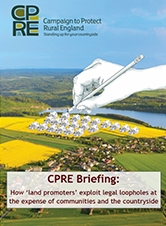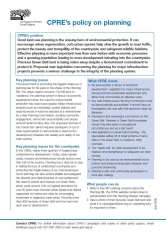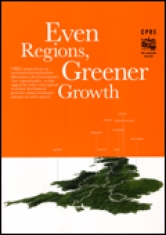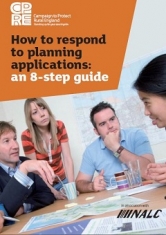Planning
Building in a small island
Why we still need the brownfield first approach
This report responds to one of the potentially most far reaching changes proposed in the Government’s consultation draft National Planning Policy Framework. It examines the proposals to cease giving clear priority nationally to development on brownfield sites (formally called ‘previously developed land’) before greenfield. It also considers the implications of the related recent policy changes made by the Government to drop the minimum housing density range which has until recently been recommended as national policy.
Cambridge - Milton Keynes - Oxford: A Corridor of Uncertainty for the Countryside
A CPRE Briefing
The Government is set to accept a recommendation from the National Infrastructure Commission (NIC) to build 1 million new homes between Oxford, Milton Keynes and Cambridge.
NIC recommendations also include 1.1 million new jobs, the re-opening of a railway link (known as ‘East West Rail’) between Cambridge and Oxford, and a major new road called the ‘Oxford-Cambridge Expressway’.
CPRE is concerned about the way the Government has approached this issue, for three key reasons:
- There is a troubling democractic deficit around these plans, and there has been no formal public consultation on the NIC recommendations;
- There has been no formal Strategic Environmental Assessment (SEA) of the impact of the proposals for development in the Arc;
- There is a lack of vision for housing.
This briefing sets out what CPRE are calling for, which is:
- A full parliamentary inquiry into the proposals
- A proper planning process with local involvement
- An Arc-wide commitment to high standards of affordable housing provision and design
- Protection and improvement of the environment
- Improvements to public transport, not a new road
CPRE Briefing
How ‘land promoters’ exploit legal loopholes at the expense of communities and the countryside
This short briefing sheds some light onto how self-styled ‘land promoters’ make lucrative profits by exploiting the planning system and working against local wishes.
Land promoters persuade landowners to allow them to pursue planning permission on their land for a share in the profits once it is sold on for development.
Communities welcome good development that follows local and neighbourhood plans, but land promoters actively work against local wishes for the sake of their own profit. National planning policy allows and even encourages land promoters to do this through loopholes in the NPPF.
CPRE undertook analysis of appeal decisions concerning four land promoters, between 1 April 2012 and 31 August 2017. It shows that even in cases where local authorities had an up to date 5 year housing land supply, one in three cases are approved.
In the majority of these cases, land promoters sought to undermine authorities further by openly challenging authorities’ housing land supply. This, and other forms of speculative development, have lost communities’ faith in the planning system.
CPRE response to the Government's National Planning Policy Framework consultation
CPRE's full and summary response to the Government's National Planning Policy Framework consultation.
CPRE's policy on planning
Good land-use planning is the unsung hero of environmental protection. It can encourage urban regeneration, curb urban sprawl, help slow the growth in road traffic, protect the beauty and tranquillity of the countryside and safeguard wildlife habitats. Effective planning is more important now than ever before with economic pressures and a growing population leading to more development intruding into the countryside. Precious Green Belt land is being eaten away despite a Government commitment to protect it. Proposed new legislation concerning the planning for major infrastructure projects presents a serious challenge to the integrity of the planning system.
CPRE's policy on regeneration of the Thames Estuary
This policy position statement sets out the background to CPRE’s interest in regeneration of the Thames Estuary and the principles by which we think the area should be planned over the coming decades. It represents the combined views of the CPRE Essex, CPRE Kent and CPRE London branches as well as national CPRE.
CPRE's policy on the Oxford-Milton Keynes-Cambridge Arc
This policy position statement sets out the background to CPRE’s interest in the Cambridge – Milton Keynes – Oxford Arc and the principles by which we think the area should be planned over the coming decades.
In November 2017, the Government's National Infrastructure Commission (NIC) recommended 1 million new homes and 1.1 million new jobs should be created in this area by 2050.
In this statement, we set out a series of principles that the Government should follow in its response to the NIC. They are:
- We should aim to protect and enhance the countryside, landscape and heritage assets.
- There are other parts of England, particularly in the Midlands and northern regions, that need regeneration and merit investment more than the area of the Arc.
- In housing, the main priority should be providing the affordable housing needed by existing residents supported by sustainable public transport.
- Sustainable transport at all levels, including East-West Rail, should be supported and prioritised over new road-building.
- There needs to be wide-scale public engagement and consultation both on the overall growth proposals and on the Expressway proposal.
Even Regions, Greener Growth
A major new report highlighting the link between disparities in economic performance between the English regions and the consequences for the environment and quality of life. The report sets out for the first time how continuing urban decay and population loss in the less prosperous areas is coupled with sprawling development and worsening congestion in others. It challenges the Government to ensure that, rather than exacerbating these problems by relaxing planning controls and building more infrastructure, the drive for a more even pattern of economic growth promotes an urban renaissance and protects the countryside in all regions.
How Green is my Region?
How to respond to planning applications
An eight-step guide
Most significant developments in the United Kingdom require planning permission from a local planning authority. This process usually involves the submission of a planning application. As a member of the public, you are entitled to examine and comment on planning applications as they are made. This is your chance to press for planning decisions that work for the good of the environment and your local community. This guide tells you how to find out more about a planning application and — if necessary — how you can take action.









